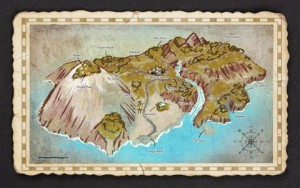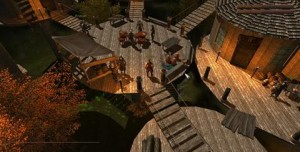
“Search for Common Ground”, a multinational NGO in Lebanon, has been developing a new video game called “Cedaria: Blackout” that aims to promote conflict among teenagers in order to hopefully achieve a sustainable peace someday (sounds more like an impossible mission).

The game is set on a fantasy island called Cedaria – a reference to Lebanon’s national symbol, the cedar – at the end of the 19th century. Players begin by returning to the island after an absence of some years, having heard tales of the country’s wealth and the power of the Phoenix, a unique machine capable of providing the entire island with wireless electricity.
When they arrive, however, they learn that someone has sabotaged the Phoenix, scattering the pieces across the island’s 14 zones, and that the island has been without electricity for months.
In the darkness, enmity begins to grow between the island’s four clans. Players must gather the pieces of the Phoenix and figure out who destroyed it and why. The choices they make along the way may help to reconcile Cedaria’s inhabitants or drive them further apart.
Players can set out to solve five different mysteries, each requiring them to complete 10 missions. Each choice they make has unique consequences, encouraging them to play multiple times to find out how each decision affects the final outcome.
“They can choose the wrong response,” Jacquard says, “but then they will face the consequences of their actions. They’ll realize that they may have saved time [by doing things] the wrong way, but if they had thought twice about it and tried negotiation as an alternative to violence then they would have gained more points and achieved their goal more easily.”
The game aims to promote virtual collaboration while engendering real-life tolerance and teamwork. “Because it’s a multiplayer game [on] Facebook, players will have to build alliances with people they don’t know,” Jaquard says, “who might not come from the same sectarian or socioeconomic background. So they will have to overcome all those stereotypes and prejudices.
While the game steers clear of physical combat – though characters are able to fight – players face challenges such as corruption, inequality, racism, crime, monopolization of resources and blackmail.
“The game was inspired by situations like those we experience in Lebanon,” Jacquard says, “like loss of electricity and sectarian issues.”
It can’t get any more Lebanese than this! Although the game plot sounds somehow interesting, the graphics don’t seem very appealing so far. But anyway, we will judge when it will be released in March this year.
For more information about Cedaria: Blackout, you can check this Daily Star article about it, as well as the official website www.cedariagame.com.

Hi Rami,
You can view more graphics here:
http://www.indiegogo.com/projects/cedaria-blackout?c=gallery
(where you can also still support our project financially – every single dollar we get will be invested in improving the game!)
Thanks for featuring us in your blog!
/Cedaria Blackout Team